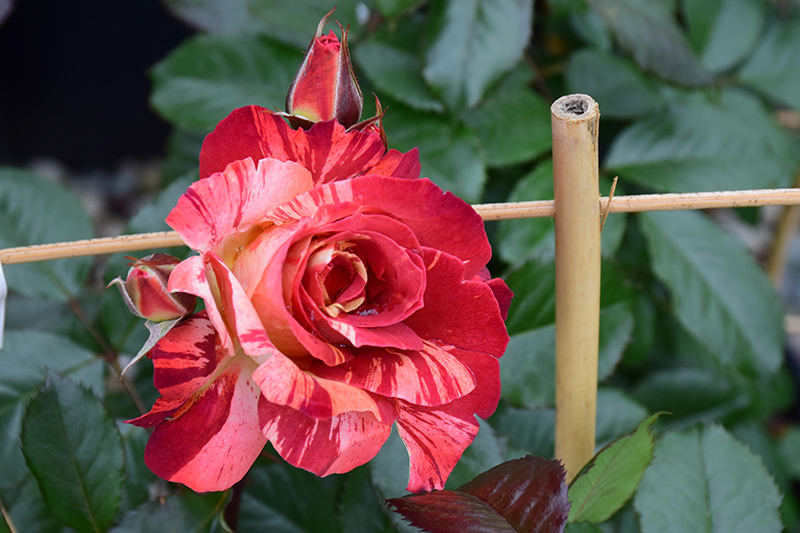>> Home
Height: 12 feet
Spread: 3 feet
Sunlight:
![]()
Hardiness Zone: 5
Group/Class: Climbing Rose
Brand: Weeks Roses
Description:
A unique and fascinating climber that produces dazzling orange-sunset colored blooms with contrasting cream stripes and smoky purple overtones; deep green, highly glossy foliage emerges from dark burgundy shoots; perfect for garden walls and trellises
Ornamental Features
Tropical Lightning™ Rose features showy lightly-scented double orange flowers with scarlet overtones and creamy white stripes along the branches from mid spring to early fall. The flowers are excellent for cutting. It has dark green deciduous foliage. The glossy oval compound leaves do not develop any appreciable fall color.
Landscape Attributes
Tropical Lightning™ Rose is a multi-stemmed deciduous woody vine with a twining and trailing habit of growth. Its average texture blends into the landscape, but can be balanced by one or two finer or coarser trees or shrubs for an effective composition.
This woody vine will require occasional maintenance and upkeep, and should only be pruned after flowering to avoid removing any of the current season's flowers. It is a good choice for attracting bees and butterflies to your yard. Gardeners should be aware of the following characteristic(s) that may warrant special consideration;
- Spiny
Tropical Lightning™ Rose is recommended for the following landscape applications;
- Mass Planting
- Hedges/Screening
- General Garden Use
Planting & Growing
Tropical Lightning™ Rose will grow to be about 12 feet tall at maturity, with a spread of 3 feet. As a climbing rose, it can be leggy near the base and may be concealed by underplanting with lower-growing facer plants. It should be planted near a fence, trellis or other landscape structure where it can be trained to grow upwards on it, or allowed to trail off a retaining wall or slope. It grows at a fast rate, and under ideal conditions can be expected to live for approximately 30 years.
This woody vine should only be grown in full sunlight. It does best in average to evenly moist conditions, but will not tolerate standing water. It may require supplemental watering during periods of drought or extended heat. It is not particular as to soil type or pH. It is highly tolerant of urban pollution and will even thrive in inner city environments. This particular variety is an interspecific hybrid.
